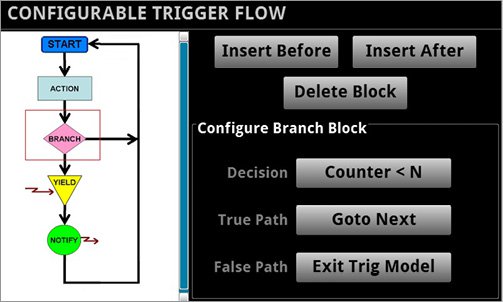
Contact us
Call us at
Available 6:00 AM – 5:00 PM (PST) Business Days
Download
Download Manuals, Datasheets, Software and more:
Feedback
2460 Source Measure Unit
2460 SMU Instrument Datasheet
More Information
- 2400 Graphical Series SMU
- Product Support
- Explore more Software models
Read Online:
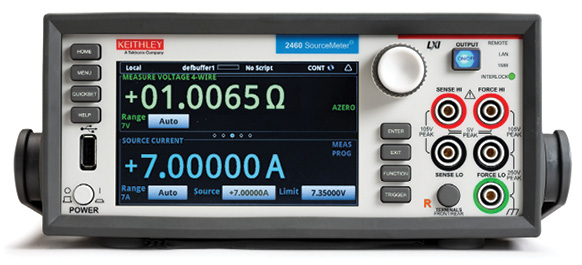
The 2460 High Current SourceMeter® Source Measure Unit (SMU) Instrument brings advanced Touch, Test, Invent® technology right to your fingertips. It combines an innovative graphical user interface (GUI) with capacitive touchscreen technology to make testing intuitive and minimize the learning curve to help engineers and scientists learn faster, work smarter, and invent easier. With its 7A DC and pulse current capability, the 2460 is optimized for characterizing and testing high power materials, devices, and modules such as silicon carbide (SiC), gallium nitride (GaN), DC-DC converters, power MOSFETs, solar cells and panels, LEDs and lighting systems, electrochemical cells and batteries, and much more. These new capabilities, combined with Keithley’s decades of expertise in developing high precision, high accuracy SMU instruments, will make the 2460 a “go-to instrument” for high current applications in the lab and in the rack for years to come.
Key Features
- One tightly coupled instrument that combines capabilities from analyzers, curve tracers, and I-V systems at a fraction of their cost
- Wide coverage up to 105 V, 7 A DC/7 A pulse, 100 W max.
- Five-inch, high resolution capacitive touchscreen GUI
- 0.012% basic measure accuracy with 6½-digit resolution
- Source and sink (4-quadrant) operation
- Four “Quickset” modes for fast setup and measurements
- Context-sensitive help function
- Front panel input banana jacks; rear panel input mass termination screw connections
- 2460 SCPI and TSP® scripting programming modes
- Front-panel USB 2.0 memory I/O port for transferring data, test scripts, or test configurations
Learn Faster, Work Smarter, Invent Easier
The 2460 features a five-inch, full-color, high resolution touchscreen that supports intuitive operation, helps operators become familiar with the instrument quickly, and optimizes overall speed and productivity. A simple icon-based menu structure reduces the number of steps required to configure a test by as much as 50 percent and eliminates the cumbersome multi-layer menu structures typically used on soft-key instruments. Built-in, context-sensitive help supports intuitive operation and minimizes the need to review a separate manual. These capabilities, combined with the 2460’s high versatility, simplify its operation in both basic and advanced measurement applications, regardless of the user’s previous experience in working with SMU instruments.


2460 main home screen.

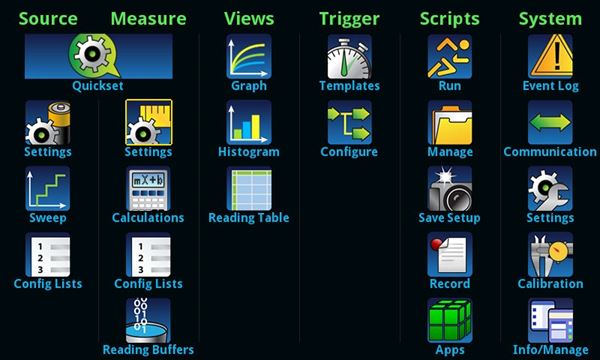
Model 2460 icon-based menu.
All-in-One SMU Instrument
The 2460, built on the fourth generation of the award-winning SourceMeter SMU platform, leverages the proven capabilities of previously introduced high current SMU instruments from Keithley, including the 2420, 2425, and 2440. It offers a highly flexible, four-quadrant voltage and current source/load coupled with precision voltage and current measurements. This all-in-one instrument gives you the capabilies of a:

- Precision power supply with V and I readback
- True current source
- Digital multimeter (DCV, DCI, ohms, and power with 6½-digit resolution)
- Precision electronic load
- Trigger controller
| 2420/2425/2440型 | 2460型 |
| Max Voltage: 60V/100V/40V | Max Voltage: 100V |
| Max Current: 3A/3A/5A | Max Current: 7A |
| DC Power: 60W/100W/50W | DC Power: 100W |
| Wideband Noise: 10mVrms typ. | Wideband Noise: 2mVrms typ. |
| Sweep Types: Linear, Log, Custom, Source-Memory | Sweep Types: Linear, Log, Dual Linear, Dual Log, Custom |
| 5000 Point Reading Buffer | >250,000 Point Reading Buffer |
| >2000 Readings/second | >3000 Readings/second |
| SCPI Programming | SCPI Programming + TSP Scripting |
| GPIB, RS-232 | GPIB,USB, Ethernet(LXI) |
| Front/Rear Banana Jacks | Front: Banana Jacks. Rear: Mass Screw Terminal Connection |
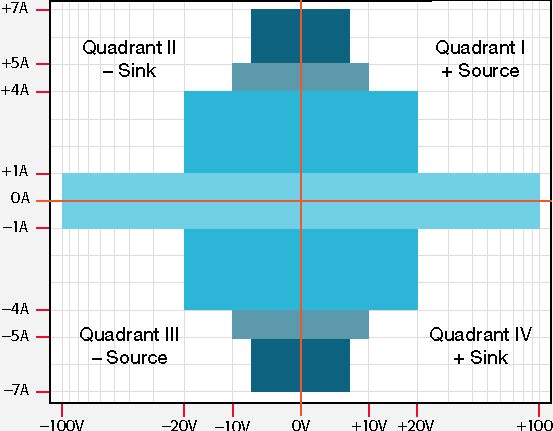
Ease of Use Beyond the Touchscreen


2460 front panel with high-resolution, capacitive touchscreen.
In addition to its advanced touchscreen, the 2460’s front panel offers a variety of features that enhance its speed, user-friendliness, and learnability, including a USB 2.0 memory I/O port, a HELP key, a rotary navigation/control knob, a front/rear input selector button, and banana jacks for basic bench applications. The USB 2.0 memory port simplifies storing test results and instrument configurations, uploading test scripts into the instrument, and installing system upgrades. All front-panel buttons are backlit to enhance visibility in low-light environments.
Four “Quickset” modes simplify instrument setup. With one touch, the instrument can be quickly configured for various operating modes without the need to configure the instrument indirectly for this operation.

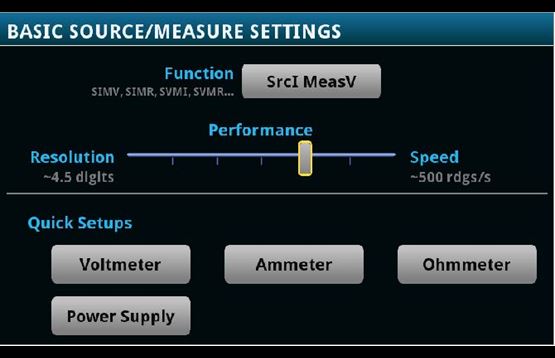
One-touch Quickset modes speed measurement setups and minimize the time to measurements.
Comprehensive Built-in Connectivity
Rear panel access to rear-input mass termination connector, remote control interfaces (GPIB, USB 2.0, and LXI/Ethernet), D-sub 9-pin digital I/O port (for internal/ external trigger signals and handler control), instrument interlock control, and TSP-Link® jacks make it simple to configure multiple instrument test solutions and eliminate the need to invest in additional adapter accessories.
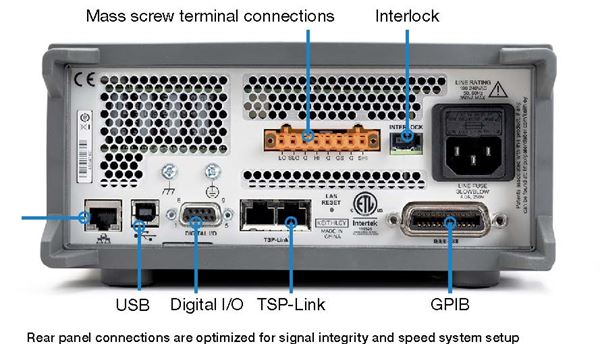

Rear panel connections are optimized for signal integrity and speed system setup
Convert Raw Data to Information
A full graphical plotting window converts raw data and displays it immediately as useful information, such as semiconductor I-V curves and voltammograms. Using the 2460’s Sheet view, test data can also be displayed in tabular form. The instrument supports exporting data to a spreadsheet for further analysis, dramatically improving productivity for research, benchtop testing, device qualification, and debugging.
TriggerFlow® Building Blocks for Instrument Control and Execution
The 2460 incorporates Keithley’s TriggerFlow triggering system, which provides user control over instrument execution. TriggerFlow diagrams are created in much the same way that flow charts are developed, using four fundamental building block types:
- Wait – Waits for an event to occur before the flow continues
- Branch – Branches when a condition has been satisfied
- Action – Initiates an action in the instrument, for example, measure, source, delay, set digital I/O, etc.
- Notify – Notifies other equipment that an event has occurred

TriggerFlow building blocks allow creating triggering models that range from very simple to highly complex.
A TriggerFlow model using a combination of these building blocks can be created from the front panel or by sending remote commands. With the TriggerFlow system, users can build triggering models from very simple to complex with up to 255 block levels. The 2460 also includes basic triggering functions, including immediate, timer, and manual triggering.




Built-in data display, charting, and spreadsheet export functions simplify converting test results into useful information.
Unmatched System Integration and Programming Flexibility
When a 2460 is configured into a multi-channel I-V test system, its embedded Test Script Processor (TSP®) allows it to run test scripts, so users can create powerful measurement applications with significantly reduced development times. TSP technology also offers channel expansion without a mainframe. Keithley’s TSP-Link® channel expansion bus, which uses a 100 Base T Ethernet cable, can connect multiple 2460s and other TSP instruments such as Keithley’s 2450 SourceMeter SMU Instruments, Series 2600B System SourceMeter SMU instruments, and Series 3700A Switch/Multimeter systems in a master-slave configuration that operates as one integrated system. The TSP-Link expansion bus supports up to 32 units per GPIB or IP address, making it easy to scale a system to fit an application’s particular requirements. The 2460 also includes a SCPI programming mode that takes advantage of all of the instrument’s capabilities.
Parallel Test Capability
The TSP technology in the 2460 supports testing multiple devices in parallel to meet the needs of device research, advanced semiconductor lab applications, and even high throughput production test. This parallel testing capability allows each instrument in the system to run its own complete test sequence, creating a fully multi-threaded test environment. The number of tests that can be run in parallel on a 2460 can be as high as the number of instruments in the system.
KickStart Instrument Control Start-up Software
The 2460 comes with KickStart instrument control/start-up software, which lets users start taking measurements in minutes without programming. In most cases, users merely need to make some quick measurements, graph the data, and store the data to disk for later analysis in software environments such as Excel. KickStart offers:
- Instrument configuration control to perform I-V characterization
- Native X-Y graphing, panning, and zooming
- Spreadsheet/tabular viewing of data
- Saving and exporting data for further analysis
- Saving of test setups
- Screenshot capturing of graph
- Annotation of tests
- Command line dialog for sending and receiving data
- HTML help
- GPIB, USB 2.0, Ethernet compliance
A Free trial version of KickStart is available at https://www.tek.com/keithley-kickstart.


KickStart start-up software lets users be ready to take measurements in minutes.
Simplified Programming with Ready-to-Use Instrument Drivers
For those who prefer to create their own customized application software, native National Instruments LabVIEW® drivers, as well as IVI-C and IVI-COM drivers are available at www.tek.com
Specifications
Voltage Specifications1, 2
|
Source |
Measure 3 |
||||||
|
Range |
Max. Current |
Resolution |
Accuracy (23° ± 5°C)1 Year±(% setting + volts) |
Noise (RMS) (<10 Hz) |
Resolution |
Input Resistance |
Accuracy (23° ± 5°C)1 Year±(% rdg. + volts) |
|
200.0000 mV |
7.35 A |
5 μV |
0.015% + 200 µV |
1 µV |
100 nV |
>10 GΩ |
0.012% + 200 µV |
|
2.000000 V |
7.35 A |
50 µV |
0.015% + 300 µV |
10 µV |
1 µV |
>10 GΩ |
0.012% + 300 µV |
|
7.000000 V |
7.35 A |
250 µV |
0.015% + 2.4 mV |
100 µV |
1 µV |
>10 GΩ |
0.015% + 1 mV |
|
10.00000 V |
5.25 A |
500 µV |
0.015% + 2.4 mV |
100 µV |
10 µV |
>10 GΩ |
0.015% + 1 mV |
|
20.00000 V |
4.20 A |
500 µV |
0.015% + 2.4 mV |
100 µV |
10 µV |
>10 GΩ |
0.015% + 1 mV |
|
100.0000 V |
1.05 A |
2.5 mV |
0.015% + 15 mV |
1 mV |
100 µV |
>10 GΩ |
0.015% + 5 mV |
Current Specifications 1, 2, 5
|
Source |
Measure3 |
||||||
|
Range |
Max. Voltage |
Resolution |
Accuracy (23° ±5°C) 41 Year±(% setting + amps) |
Noise (RMS) (<10 Hz) |
Resolution 4 |
Voltage Burden 6 |
Accuracy (23° ±5°C)1 Year±(% rdg. + amps) |
|
1.000000 μA |
105 V |
50 pA |
0.025% + 1 nA |
40 pA |
10 pA |
<100 µV |
0.025% + 700 pA |
|
10.00000 μA |
105 V |
500 pA |
0.025% + 1.5 nA |
40 pA |
10 pA |
<100 µV |
0.025% + 1 nA |
|
100.0000 μA |
105 V |
5 nA |
0.020% + 15 nA |
100 pA |
100 pA |
<100 µV |
0.020% + 10 nA |
|
1.000000 mA |
105 V |
50 nA |
0.020% + 150 nA |
1 nA |
1 nA |
<100 µV |
0.020% + 100 nA |
|
10.00000 mA |
105 V |
500 nA |
0.020% + 1.5 μA |
10 nA |
10 nA |
<100 µV |
0.020% + 1 μA |
|
100.0000 mA |
105 V |
5 μA |
0.020% + 15 μA |
100 nA |
100 nA |
<100 µV |
0.020% + 10 μA |
|
1.000000 A |
105 V |
50 μA |
0.050% + 750 μA |
5 μA |
1 μA |
<100 µV |
0.050% + 500 μA |
|
4.000000 A |
21 V |
250 μA |
0.100% + 3 mA |
25 μA |
1 μA |
<100 µV |
0.100% + 2.5 mA |
|
5.000000 A |
10.5 V |
250 μA |
0.100% + 3 mA |
25 μA |
1 μA |
<100 µV |
0.100% + 2.5 mA |
|
7.000000 A |
7.35 V |
500 μA |
0.150% + 6 mA |
125 μA |
1 μA |
<100 µV |
0.150% + 5 mA |
Temperature Coefficient
(0°–18°C and 28°–50°C) — ±(0.10 × accuracy specification)/°C.
Notes
- Speed = 1 PLC.
- All specifications are guaranteed with output ON.
- Accuracies apply to 2- and 4-wire mode when properly zeroed.
- 6.5-digit measure resolution.
- Accuracy specifications guaranteed when using 2460-KIT screw terminal accessory.
- Four-wire mode.
Resistance Measurement Accuracy (Local or Remote Sense) 1, 2, 3
|
Range |
Default Resolution 4 |
DefaultTest Current |
Normal Accuracy(23°C ±5°C)1 Year, ±(% rdg. + ohms) |
Enhanced Accuracy 5(23°C ±5°C)1 Year, ±(% rdg. + ohms) |
|
<2.000000 W6 |
1 μW |
User defined |
Source IACC + Meas. VACC |
Meas. IACC + Meas. VACC |
|
20.00000 W |
10 μW |
100 mA |
0.05% + 0.003 Ω |
0.04% + 0.001 Ω |
|
200.0000 W |
100 μW |
10 mA |
0.05% + 0.03 Ω |
0.04% + 0.01 Ω |
|
2.000000 kW |
1 mW |
1 mA |
0.05% + 0.3 Ω |
0.04% + 0.1 Ω |
|
20.00000 kW |
10 mW |
100 μA |
0.05% + 3 Ω |
0.04% + 1 Ω |
|
200.0000 kW |
100 mW |
10 μA |
0.05% + 30 Ω |
0.05% + 10 Ω |
|
2.000000 MW |
1 W |
10 μA |
0.06% + 100 Ω |
0.06% + 50 Ω |
|
20.00000 MW |
10 W |
1 μA |
0.14% + 1000 Ω |
0.12% + 500 Ω |
|
>20.0000 MW6 |
— |
User defined |
Source IACC + Meas. VACC |
Meas. IACC + Meas. VACC |
Temperature Coefficient
(0°–18°C and 28°–50°C) — ±(0.10 × accuracy specification)/°C.
Source Current,
Measure Resistance Mode — Total uncertainty = Isource accuracy + Vmeasure accuracy (4-wire remote sense).
Source Voltage,
Measure Resistance Mode — Total uncertainty = Vsource accuracy + Imeasure accuracy (4-wire remote sense).
Guard Output Impedance — 0.5 Ω (DC) in ohms mode.
Notes
- Speed = 1 PLC.
- All specifications are guaranteed with output ON.
- Accuracies apply to 2- and 4-wire mode when properly zeroed.
- 6.5-digit measure resolution.
- Source readback enabled. Offset compensation ON.
- Source current, measure resistance or source voltage, measure resistance only.
Supplemental Characteristics
Max. Output Power — 100 W, four-quadrant source or sink operation.
Source Limits — Vsource: ±7.35 V (≤7 A range), ±10.5 V (≤5 A range), ±21 V (≤4 A range), ±105 V (≤1 A range).Isource: ±7.35 A (≤7 V range), ±5.25 mA (≤10 V range), ±4.2 A (≤20 V range), ±1.05 mA (≤100 V range).
Overrange — 105% of range, source and measure.
Regulation — Voltage: Line: 0.01% of range. Load: 0.01% of range + 100 µV.Current: Line: 0.01% of range. Load: 0.01% of range + 100 pA.
Source Limits — Voltage Source Current Limit: Bipolar current limit set with single value. Min. 10% of range.Current Source Voltage Limit: Bipolar voltage limit set with single value. Min. 10% of range.
V-Limit / I-Limit Accuracy — Add 0.3% of setting and ±0.02% of reading to base specification.
Overshoot — Voltage Source: <0.1% typical (full scale step, resistive load, 20 V range, 10 mA I-Limit.Current Source: <0.1% typical (1 mA step, RLoad = 10 kΩ, 20 V range).
Range Change OvershootOvershoot into a fully resistive 100 kΩ load, 10 Hz to 20 MHz BW, adjacent ranges: <250 mV typical.
Output Settling Time — Time required to reach 0.1% of final value, 20 V range, 100 mA I-Limit: <200 µs typical.
Maximum Slew Rate — 1 V per µs, 100 V range, 100 mA limit into a 20 kΩ load (typical). 0.6 V per µs, 20 V range, 100 mA limit into a 20 kΩ load (typical).
Over Voltage Protection — User selectable values, 5% ±0.5 V tolerance. Factory default = none.
Voltage Source Noise — 10Hz–20MHz (RMS): <4.5 mV typical into a resistive load.
Common Mode Voltage — 250V DC.
Common Mode Isolation — >1G Ω, <1000 pF.
Noise Rejection (typical)
|
NPLC |
NMRR |
CMRR |
|
0.01 |
— |
60 dB |
|
0.1 |
— |
60 dB |
|
1 |
60 dB |
100 dB |
Load Impedance — Normal Mode: 20 nF typical.High Capacitance Mode: Stable into 50 μF typical. High-C mode valid for ≥100 µA ranges.
Max. Voltage Drop Between
Force and Sense Terminals — 5 V.
Max. Sense Lead Resistance — 1 MΩ for rated accuracy.
Sense Input Impedance — >10 GΩ.
Guard Offset Voltage — <300 µV, typical
System Measurement Speeds 1
Reading Rates (readings/second) typical for 60 Hz (50 Hz), script (TSP®) programmed
|
NPLC |
Trigger Origin |
Measure to Memory |
Measure to GPIB/USB/LAN |
Source-Measure to Memory |
Source-Measure to GPIB/USB/LAN |
|
0.01 |
Internal |
3050 (2800) |
2800 (2500) |
1700 (1600) |
1650 (1550) |
|
0.01 |
External |
2300 (2100) |
2150 (2000) |
1650 (1550) |
1600 (1450) |
|
0.1 |
Internal |
540 (460) |
530 (450) |
470 (410) |
470 (400) |
|
0.1 |
External |
500 (420) |
500 (420) |
460 (390) |
450 (350) |
|
1.00 |
Internal |
59 (49) |
59 (49) |
58 (48) |
58 (48) |
|
1.00 |
External |
58 (48) |
58 (48) |
57 (48) |
57 (46) |
Reading Rates (readings/second) typical for 60 Hz (50 Hz), SCPI programmed
|
NPLC |
Trigger Origin |
Measure to Memory |
Measure to GPIB/USB/LAN |
Source-Measure to Memory |
Source-Measure to GPIB/USB/LAN |
|
0.01 |
Internal |
3000 (2800) |
3000 (2790) |
1700 (1600) |
1550 (1500) |
|
0.01 |
External |
2330 (2150) |
2330 (2150) |
1650 (1550) |
1500 (1450) |
|
0.1 |
Internal |
540 (460) |
540 (460) |
470 (410) |
460 (400) |
|
0.1 |
External |
510 (430) |
510 (430) |
470 (400) |
460 (390) |
|
1.00 |
Internal |
59 (49) |
59 (49) |
58 (48) |
58 (48) |
|
1.00 |
External |
58 (49) |
58 (49) |
58 (48) |
58 (48) |
Notes
- Reading rates applicable for voltage or current measurements, autozero off, autorange off, filter off, binary reading format, and source readback off.
Supplied Accessories
2460-KIT — Rear Panel Mating Mass Terminated Screw Connector
CS-1616-3 Safety Interlock Mating Connector
17469460X — TSP-Link/Ethernet Cable
2460 QuickStart Guide
TSP Toolkit Software (available at www.tek.com)
KickStart Startup Software (available at www.tek.com)
LabVIEW and IVI Drivers (available at www.tek.com)
Available Accessories
Test Leads and Probes
1754 2-wire Universal 10-Piece Test Lead Kit
5805 — Kelvin (4-Wire) Spring-Loaded Probes
5808 — Low Cost Single-pin Kelvin Probe Set
Cables, Connectors, Adapters
2460-BAN — Screw Terminal Connector to Banana Cable
2460-KIT — Mating Mass Termination Connector
CS-1616-3 Safety Interlock Mating Connector
Communication Interfaces & Cables
7007-1 — Shielded GPIB Cable, 1 m (3.3 ft)
KPCI-488LPA — IEEE-488 Interface for PCI Bus
KUSB-488B — IEEE-488 USB-to-GPIB Interface Adapter
Triggering and Control
2450-TLINK — DB-9 to Trigger Link Connector Adapter.
8501-1 Trigger Link Cable, DIN-to-DIN, 1 m (3.3 ft)
8501-2 Trigger Link Cable, DIN-to-DIN, 2 m (6.6 ft)
Rack Mount Kits
4299-8 — Single Fixed Rack Mount Kit
4299-9 — Dual Fixed Rack Mount Kit
Available Services
2460-3Y-EW — 1 Year Factory Warranty extended to 3 years from date of shipment
2460-5Y-EW — 1 Year Factory Warranty extended to 5 years from date of shipment
C/2460-3Y-17025 KeithleyCare® 3 Year ISO 17025 Calibration Plan
C/2460-3Y-DATA — KeithleyCare 3 Year Calibration w/Data Plan
C/2460-3Y-STD — KeithleyCare 3 Year Std. Calibration Plan
C/2460-5Y-17025 KeithleyCare 5 Year ISO 17025 Calibration Plan
C/2460-5Y-DATA — KeithleyCare 5 Year Calibration w/Data Plan
C/2460-5Y-STD — KeithleyCare 5 Year Std. Calibration Plan
C/NEW DATA — Calibration Data for New Units
C/NEW DATA ISO — ISO-17025 Calibration Data for New Units
General Characteristics (default mode unless specified)
Factory Default
Standard Power-Up — SCPI Mode.
Source Output Modes — Fixed DC Level, Memory/Configuration List (mixed function), Sweep (linear and logarithmic), Sweep (dual linear and dual logarithmic.
Memory Buffer — >250,000 readings. Includes selected measured value(s) and time stamp.
Real-Time Clock — Lithium battery backup (3 yr. + battery life).
Remote Interfaces
GPIB — IEEE-488.1 compliant. Supports IEEE-488.2 common commands and status model topology.
USB Device
(rear panel, type B) — 2.0 Full Speed USBTMC.
USB Host
(front panel, type A) — USB 2.0, support for flash drives, FAT32.
Ethernet: RJ-45 (10/100BT)
Digital I/O Interface
Lines — 6 Input/Output user defined for digital I/O or triggering.
Connector — 9-pin female D.
Input Signal Levels — 0.7 V (maximum logic low), 3.7 V (minimum logic high).
Input Voltage Limits — –0.25 V (Abs. minimum), +5.25 V (Abs. maximum).
Maximum Source Current — +2.0 mA @ >2.7 V (per pin).
Maximum Sink Current — –50 mA @ 0.7 V (per pin, solid-state fuse protected).
5 V Power Supply Pin — Limited to 500 mA @ >4 V (solid-state fuse protected).
Handler — User definable Start of Test, End of Test, 4 category bits.
Programmability — SCPI or TSP command sets.
TSP Mode — Embedded Test Script Processor (TSP) accessible from any host interface.
IP Configuration — Static or DHCP.
Expansion Interface — The TSP-Link expansion interface allows TSP enabled instruments to trigger and communicate with each other.
LXI Compliance — 1.4 LXI Core 2011.
Display — 5 inch capacitive touch, color TFT WVGA (800×480) with LED backlight.
Input Signal Connections — Front: Banana. Rear: Mass termination screw terminal.
Interlock — Active High Input.
Cooling — Forced air, variable speed.
Over Temperature Protection — Internally sensed temperature overload puts unit in standby mode.
Power Supply — 100 V to 240 V RMS, 50–60 Hz (automatically detected at power up).
VA Rating — 350 volt-amps max.
Altitude — Maximum 2000 meters above sea level.
EMC — Conforms to European Union EMC Directive.
Safety — Compliance with CE and NRTL listed to UL61010-1 and UL61010-2-30. Conforms with European Union Low Voltage Directive.
Vibration — MIL-PRF-28800F Class 3 Random.
Warm-Up — 1 hour to rated accuracies.
Dimensions — With bumpers and handle: 106 mm high × 255 mm wide × 425 mm deep (4.18 in × 10.05 in × 16.75 in). Without bumpers and handle: 88 mm high × 213 mm wide × 403 mm deep (3.46 in × 8.39 in × 15.87 in.)
Weight — With bumpers and handle: 4.75 kg (10.5 lbs.).Without bumpers and handle: 4.35 kg (9.6 lbs.).
Environment — Operating: 0°–50°C, 70% R.H. up to 35°C. Derate 3% R.H./°C, 35°–50°C.Storage: –25°C to 65°C.
Accessories Supplied — Test Leads, Mating Mass Terminated Screw Connector, USB Cable, Ethernet/TSP Cable, Interlock Adapter, Power Cord, QuickStart Guide, CD User’s Manual.
Ordering Information
2460 100 V, 7 A, 100 W SourceMeter Instrument
Warranty Information
Warranty Summary — This section summarizes the warranties of the 2460. For complete warranty information, refer to the 2460 Reference Manual. Any portion of the product that is not manufactured by Keithley is not covered by this warranty and Keithley will have no duty to enforce any other manufacturer’s warranties.
Hardware Warranty — Keithley Instruments, Inc. warrants the Keithley manufactured portion of the hardware for a period of one year from defects in materials or workmanship; provided that such defect has not been caused by use of the Keithley hardware which is not in accordance with the hardware instructions. The warranty does not apply upon any modification of Keithley hardware made by the customer or operation of the hardware outside the environmental specifications.
Software Warranty — Keithley warrants for the Keithley produced portion of the software or firmware will conform in all material respects with the published specifications for a period of ninety (90) days; provided the software is used on the product for which it is intended in accordance with the software instructions. Keithley does not warrant that operation of the software will be uninterrupted or error-free, or that the software will be adequate for the customer’s intended application. The warranty does not apply upon any modification of the software made by the customer.

